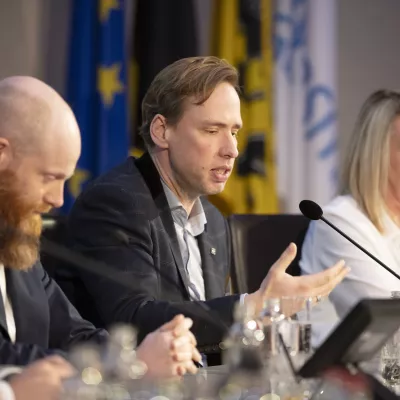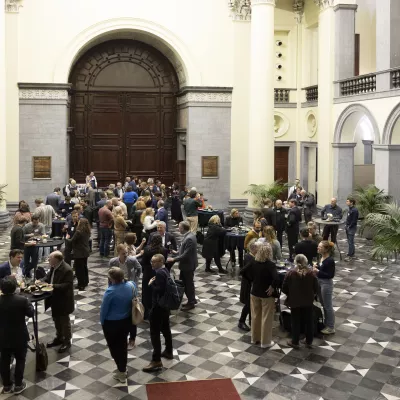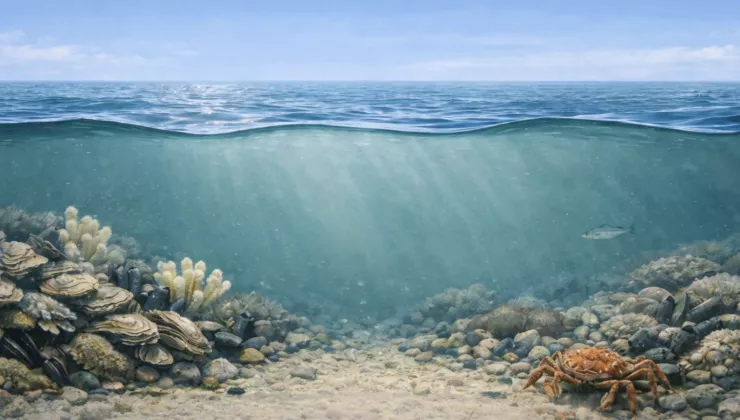Debate on the future of the Belgian North Sea
Participants
The debate was moderated by Tobe Steel, editor at De Tijd. The following people participated in this debate:
- Bert Wollants, member of the Belgian parliament (N-VA);
- Stijn De Roo, member of the Flemish parliament (CD&V);
- Jeroen Soete, city councillor in Ostend (Vooruit);
- Jeroen Van Lysebettens, city councillor in Ghent (Groen);
- Kim Meeus, deputy chief of staff for the North Sea (Open VLD); and
- Luc Goossens, managing director at Laborelec.
Recommendations
After a short introduction by Piet Opstaele, CEO of De Blauwe Cluster, the debate started. Three topics were discussed: energy; maritime security; and maritime spatial planning. Below you can find the most important elements that were put forward.
Energy
- We should look to develop joint wind farms together with our neighbors;
- A third energy zone in the North Sea will be a major challenge. Interesting options are the combination with floating solar panels and CO2 capture combined with hydrogen production;
- Wind farms not only provide sustainable energy, but also a lot of innovation and knowledge. We must continue to invest in innovation to maintain our lead over other countries;
- Support for energy projects can be further increased through citizen cooperation.
Maritime security
- Infrastructure at sea is difficult to secure. It is important that we protect not only the hardware, but also the software. Cybersecurity in particular is a huge challenge;
- The private sector has a major role to play here as all offshore infrastructure is operated by private actors. The government can provide support with this;
- The joint statement with five of our neighboring countries and the Maritime Security Act provide a clear framework for faster and more coordinated cooperation;
- Underwater drones can help keep a close eye on everything.
Maritime spatial planning
- The available space on the Belgian North Sea is limited. We must therefore evolve towards multiple use of space. That is a must to stimulate innovation;
- Space is urgently needed for such innovation, and a zone with few regulations is an advantage. The aim is to maintain as many existing activities as possible;
- The draft of the new marine spatial plan (MRP) aims to cancel the zones for commercial and industrial activities. The government believes that companies will be able start up such activities on their own initiative without stimulation from the MRP and policy.
- An integrated North Sea policy is becoming increasingly important in the context of the growing blue economy, including more efficient international cooperation.
- Kustvisie is a good example of good cooperation between different policy levels.
Disclaimer: the points raised above reflect what was discussed during the debate and do not necessarily reflect the vision and viewpoints of Blue Cluster.
Mariparks
At the end of the debate, a discussion was held about the new Maripark concept. It became clear that the concept was insufficiently known among the various panelists, even though it is strongly recommended in European policy papers. Blue Cluster therefore clarifies the concept below:
Maripark zones are intended for multi-use. The concept was created to stimulate innovation, simplify procedures and encourage governments to communicate better. Mariparks help address typical concerns such as infrastructure and services, including monitoring and data management.
Such progressive zones are supported by European policies. Mariparks encourage good cooperation between policy levels and require a clear vision. In that context, the existing zones for commercial and industrial activities can be retained and developed into Mariparks.
Blue Cluster will communicate further and more widely about the opportunities of these Maripark zones in the near future.
Networking
The debate was preceded by a reception and followed by a networking session. Over a bite and a drink, those present had the opportunity to get to know each other better and share opinions about what was said during the debate.


















